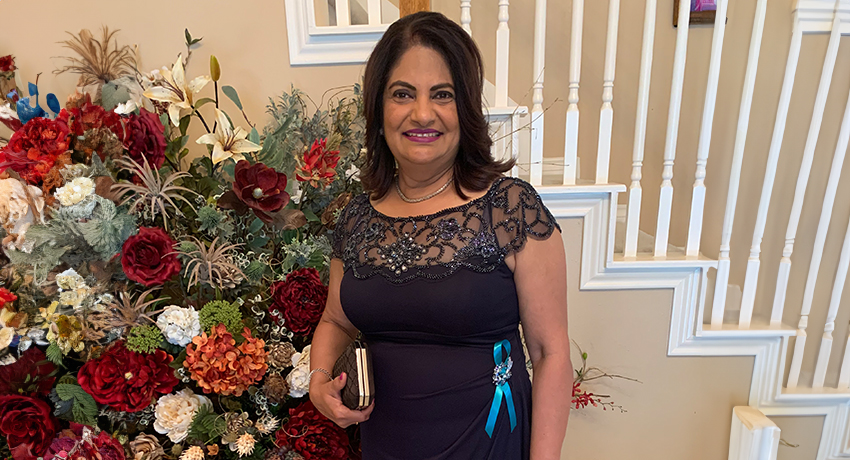Charmaine Thomas was diagnosed with fibroids about 10 years ago and closely followed by her gynecologist with an annual ultrasound. After menopause and years without problems, physician and patient decided to forego a hysterectomy.
Then one morning in early 2021, Charmaine found it difficult to urinate and had severe pain in her lower abdomen.
“I saw my primary care physician for what I thought was a urinary tract infection, but the sample analysis was normal,” she says. “I’m very aware of my body and knew something wasn’t right, so I made an appointment with my gynecologist. When she looked at the ultrasound results, she said, ‘There’s something in your right ovary’ and ordered an MRI. The results led her to refer me to a specialist, but that doctor didn’t accept my insurance.”
Seeing a gynecologic oncologist

Charmaine’s daughter, Nadhisha Seimon, an ICU nurse, did some research and referred her to Joseph A. Lucci III, MD, a gynecologic oncologist with UT Physicians. He was able to see her quickly.
“Mrs. Thomas didn’t bring her imaging studies to the appointment, but I could feel the mass,” recalls Lucci, a professor and director of the Division of Gynecologic Oncology at McGovern Medical School at UTHealth Houston. “We took her to the OR and performed a minimally invasive robotic hysterectomy. She also had endometriosis, which caused one ovary to adhere to adjacent structures and rupture. We removed her uterus, fallopian tubes, ovaries, a small section of the omentum, and a sentinel lymph node to check for metastasis.”
The pathology report showed that Charmaine had stage 1C2 ovarian clear cell carcinoma and a large implant of endometriosis that had transitioned into the same type of cancer. A rare subtype of epithelial ovarian cancer, clear cell carcinoma of the ovary is classified as high grade and can be more aggressive and harder to treat than lower-grade malignancies.
Chemotherapy for ovarian cancer treatment
“Dr. Lucci advised me to have chemotherapy but stressed that it was my decision,” Charmaine says. “He told me that if I decided to go forward with chemo, there was an 80% chance that the cancer wouldn’t recur. I decided to do it.”
After surgery, Charmaine received six cycles of chemotherapy for ovarian cancer treatment, with the last treatment in September 2021.
“I ate well, exercised, and saw Dr. Lucci for blood work every three months for two years. Everything was fine,” she says. “Even during chemotherapy, my red blood cell count was good. Dr. Lucci has a lot of experience and is very knowledgeable. I felt I could discuss anything with him. He listens and then gives his advice. He doesn’t force anything on you if you aren’t ready to do it.”
Charmaine saw Lucci every six months for three more years.
“Mrs. Thomas has a very sunny outlook, which plays a role in healing,” he says. “She also had tremendous support during treatment. Her daughter was almost always there, and her husband was by her side frequently. She has a wonderful tight-knit family that made her feel well cared for and not alone.”



